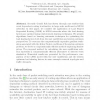Free Online Productivity Tools
i2Speak
i2Symbol
i2OCR
iTex2Img
iWeb2Print
iWeb2Shot
i2Type
iPdf2Split
iPdf2Merge
i2Bopomofo
i2Arabic
i2Style
i2Image
i2PDF
iLatex2Rtf
Sci2ools
104
click to vote
NETCOOP
2007
Springer
2007
Springer
Load Shared Sequential Routing in MPLS Networks: System and User Optimal Solutions
Recently Gerald Ash has shown through case studies that event dependent routing is attractive in large scale multi-service MPLS networks. In this paper, we consider the application of Load Shared Sequential Routing (LSSR) in MPLS networks where the load sharing factors are updated using reinforcement learning techniques. We present algorithms based on learning automata techniques for optimizing the load sharing factors both from the user equilibrium and system optimum perspectives. To overcome the computationally expensive gradient evaluation associated with the Kuhn-Tucker conditions of the system optimum problem, we derive a computationally efficient method employing shadow prices. The proposed method for calculating the user equilibrium solution represents a computationally efficient alternative to discrete event simulation. Numerical results are presented for the performance comparison of the LSSR model with the user equilibrium and the system optimum load sharing factors in some e...
Related Content
| Added | 08 Jun 2010 |
| Updated | 08 Jun 2010 |
| Type | Conference |
| Year | 2007 |
| Where | NETCOOP |
| Authors | Gilles Brunet, Fariba Heidari, Lorne Mason |
Comments (0)

